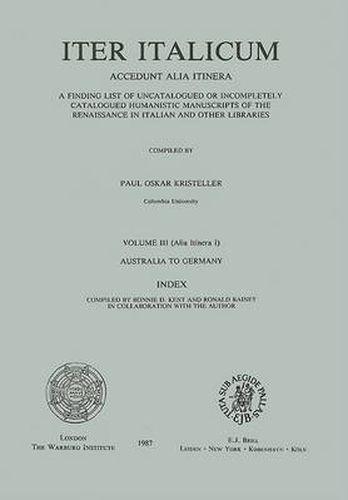Readings Newsletter
Become a Readings Member to make your shopping experience even easier.
Sign in or sign up for free!
You’re not far away from qualifying for FREE standard shipping within Australia
You’ve qualified for FREE standard shipping within Australia
The cart is loading…






The Iter Italicum is intended to provide a list of Renaissance manuscripts (1350-1600), mostly in Latin or Italian, of philosophical, scientific, philological or literary content. The list is arranged by countries, cities, libraries, collections and shelf-marks. Some manuscripts are listed on the basis of handwritten inventories (descriptions). Collections for which good printed catalogues are available are omitted in most cases. The purpose is to call attention to unknown writings of the period or to unknown copies of known works.]All the volumes serve as useful reference works for scholars in the history of philosophy, the sciences, classical learning, grammar and rhetoric, Neolatin literature, historiography of the theory of the arts and of music and related subjects. By scanning the volume or through its index, scholars will be able to find source material for individual writers as well as for certain subjects, problems or themes.
$9.00 standard shipping within Australia
FREE standard shipping within Australia for orders over $100.00
Express & International shipping calculated at checkout
Stock availability can be subject to change without notice. We recommend calling the shop or contacting our online team to check availability of low stock items. Please see our Shopping Online page for more details.
The Iter Italicum is intended to provide a list of Renaissance manuscripts (1350-1600), mostly in Latin or Italian, of philosophical, scientific, philological or literary content. The list is arranged by countries, cities, libraries, collections and shelf-marks. Some manuscripts are listed on the basis of handwritten inventories (descriptions). Collections for which good printed catalogues are available are omitted in most cases. The purpose is to call attention to unknown writings of the period or to unknown copies of known works.]All the volumes serve as useful reference works for scholars in the history of philosophy, the sciences, classical learning, grammar and rhetoric, Neolatin literature, historiography of the theory of the arts and of music and related subjects. By scanning the volume or through its index, scholars will be able to find source material for individual writers as well as for certain subjects, problems or themes.